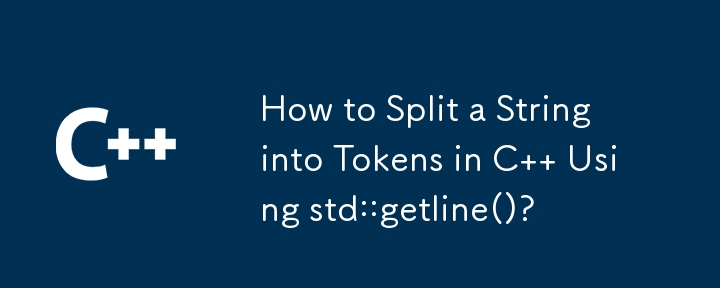Home >Backend Development >C++ >How to Split a String into Tokens in C Using std::getline()?
How to Split a String into Tokens in C Using std::getline()?
- Barbara StreisandOriginal
- 2024-11-20 16:38:11824browse

Separating String Tokens Using C std::string
This question addresses the challenge of splitting a C std::string into multiple tokens, particularly using the delimiter ";". While some suggested solutions involve external libraries like Boost, the guidelines for this project prohibit their use. Therefore, we explore a more straightforward approach using the C Standard Library.
One effective method is to utilize the std::getline() function, which offers versatility in specifying delimiters. In this case, we can implement the tokenization process as follows:
#include <sstream>
#include <iostream>
#include <vector>
using namespace std;
int main() {
vector<string> strings; // Vector to store split strings
istringstream f("denmark;sweden;india;us"); // Input stringstream
string s; // Variable to store individual strings
while (getline(f, s, ';')) {
cout << s << endl; // Display split string
strings.push_back(s); // Store string in vector
}
}
In this implementation, we create a stringstream from the input string "denmark;sweden;india;us". The std::getline() function is employed to iterate over the stringstream and retrieve tokens separated by the ";" delimiter. Each retrieved token is both printed and added to the strings vector for further processing.
By employing this approach, we achieve the desired tokenization of the input string without relying on external libraries, adhering to the specified guidelines.
The above is the detailed content of How to Split a String into Tokens in C Using std::getline()?. For more information, please follow other related articles on the PHP Chinese website!
Related articles
See more- How to Sort a Multi-Dimensional Array by the First Element of Each Subarray in C ?
- How Can I Call a C# Function Using Its Name Stored as a String?
- How Can I Create a Custom Join Table with Additional Properties in a Many-to-Many Relationship using EF Code First?
- C++ code optimization: scope and lifetime control of local variables
- Applicability of C++ metaprogramming in embedded systems and real-time applications?

